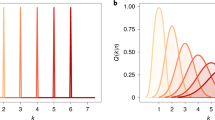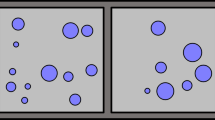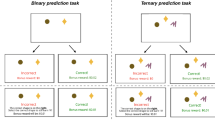Abstract
Comparison of quantitative reasoning in nonhuman animals has suffered, on the one hand, from the methodological failure to do properly controlled studies of number (for review, recent examples and exceptions see refs 1, 2; 3, 4; and 5, 6 respectively), and on the other, from the conceptual failure to consider forms of quantitative reasoning other than number. An approach to mathematical reasoning may profit from the study of proportion, a continuous quantity, in addition to number, a discrete quantity. In the experiments reported here, an adult chimpanzee and four juveniles were tested for their knowledge of ‘proportion’ and ‘number’ with conceptual match-to-sample tasks. The juveniles failed but the adult successfully matched exemplars of the proportions 1/4, 1/2, 3/4 and 1, and the numbers 1, 2, 3 and 4, when the sample and alternatives were highly dissimilar physically (such as in shape, colour) and in other quantitative (for example mass, area, length) dimensions. The results reveal the presence of simple ‘proportion’ and ‘number’ concepts in a nonhuman primate.
This is a preview of subscription content, access via your institution
Access options
Subscribe to this journal
Receive 51 print issues and online access
$199.00 per year
only $3.90 per issue
Buy this article
- Purchase on Springer Link
- Instant access to full article PDF
Prices may be subject to local taxes which are calculated during checkout
Similar content being viewed by others
References
Salman, D. H. Br. J. Psychol. 33, 209 (1943).
Wesley, F. Psychol. Bull. 53, 420 (1961).
Dooley, G. B. & Gill, T. V. in Language Learning by a Chimpanzee (ed. Rumbaugh, D. M.) 247–260 (Academic, New York, 1976).
Ferster, C. B. & Hammer, C. E. Jr in Operant Behavior: Areas of Research and Application (ed. Honig, W. K.) 634–676 (Appleton-Century-Crofts, New York, 1966).
Hayes, K. J. & Nissen, C. H. in Behavior of Nonhuman Primates Vol. 4 (eds Schrier, A. M. & Stollnitz, F.) 59–115 (Academic, New York, 1971).
Hicks, L. H. J. comp. Physiol. Psychol. 49, 212 (1956).
Premack, D. Intelligence in Ape and Man (Erlbaum, Hillsdale, New Jersey, 1976).
Premack, D., Woodruff, G. & Kennel, K. Science 202, 903 (1978).
Jensen, E. M., Reese, E. P. & Reese, T. W. J. Psychol 30, 363 (1950).
Gelman, R. & Gallistel, C. R. The Child's Understanding of Number (Harvard University Press, 1978).
Woodruff, G., Premack, D. & Kennel, K. Science 202, 991 (1978).
Gillan, D., Premack, D. & Woodruff, G. J. exp. Psychol. Anim. Behav. Processes 7, 1 (1981).
Author information
Authors and Affiliations
Rights and permissions
About this article
Cite this article
Woodruff, G., Premack, D. Primative mathematical concepts in the chimpanzee: proportionality and numerosity. Nature 293, 568–570 (1981). https://doi.org/10.1038/293568a0
Received:
Accepted:
Issue Date:
DOI: https://doi.org/10.1038/293568a0
This article is cited by
-
Wheel of Fortune: a Cross-cultural Examination of How Expertise Shapes the Mental Representations of Familiar and Unfamiliar Numerals
Computational Brain & Behavior (2022)
-
Do cuttlefish have fraction number sense?
Animal Cognition (2019)
-
Ratio abstraction over discrete magnitudes by newly hatched domestic chicks (Gallus gallus)
Scientific Reports (2016)
-
Comparison of discrete ratios by rhesus macaques (Macaca mulatta)
Animal Cognition (2016)
-
The use of proportion by young domestic chicks (Gallus gallus)
Animal Cognition (2015)
Comments
By submitting a comment you agree to abide by our Terms and Community Guidelines. If you find something abusive or that does not comply with our terms or guidelines please flag it as inappropriate.



